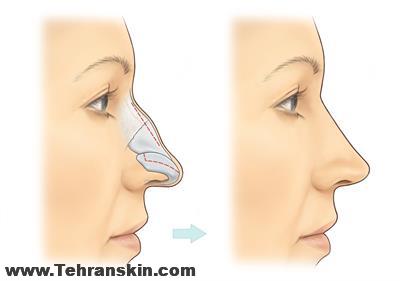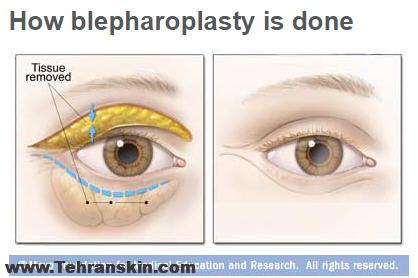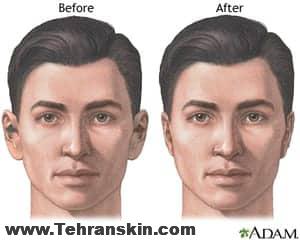
Ear surgery, also known as otoplasty, can improve the shape, position or proportion of the ear. A defect in the ear structure that is present at birth or that becomes apparent with development can be corrected by otoplasty. This procedure can also treat misshapen ears caused by an injury.
otoplasty video
Otoplasty creates a more natural shape while bringing balance and proportion to the ears and face. Correction of even minor deformities can have profound benefits to appearance and self-esteem. If protruding or disfigured ears bother you or your child, you may consider plastic surgery.
محتوای صفحه
- 1 How much does otoplasty cost?
- 1.1 Otoplasty costs may include:
- 1.2 Is cosmetic ear surgery covered by health insurance?
- 1.3 What should I expect during a consultation for ear surgery?
- 1.4 What questions should I ask my plastic surgeon about ear surgery?
- 1.5 How should I prepare for ear surgery?
- 1.6 What are the risks of ear surgery?
- 1.7 Where will my surgery be performed?
- 2 What are the steps of an ear surgery procedure?
- 3 What should you expect after ear surgery?
- 4 Ear Surgery Before & After Photo
What can ear surgery treat?
- Overly large ears – a condition called macrotia
- Protruding ears occurring on one or both sides in varying degrees – not associated with hearing loss
- Adult dissatisfaction with previous ear surgery
Who is a good candidate for otoplasty?
Children who are good candidates for ear surgery are:
- Healthy, without a life-threatening illness or untreated chronic ear infections
- Generally 5 years old, or when a child’s ear cartilage is stable enough for correction
- Cooperative and follow instructions well
- Able to communicate their feelings and do not voice objections when surgery is discussed
Teenagers and adults who are good candidates for ear surgery are:
- Healthy individuals who do not have a life-threatening illness or medical conditions that can impair healing
- Individuals with a positive outlook and specific goals in mind for ear surgery
- Nonsmokers
Ear surgery is a highly individualized procedure and you should do it for yourself, not to fulfill someone else’s desires or to try to fit any sort of ideal image.
How much does otoplasty cost?
The average cost of cosmetic ear surgery is $3,156, according to 2018 statistics from the American Society of Plastic Surgeons.
Otoplasty costs can widely vary. The average fee referenced above is only part of the total cost – it does not include anesthesia, operating room facilities or other related expenses.
A surgeon’s fee for cosmetic ear surgery will be based on his or her experience, the type of procedure used and the geographic office location.
Many plastic surgeons offer patient financing plans for cosmetic ear surgery, so be sure to ask.
Otoplasty costs may include:
- Surgeon’s fee
- Hospital or surgical facility costs
- Anesthesia fees
- Prescriptions for medication
- Post-surgery garments
- Medical tests
When choosing a board-certified plastic surgeon for ear surgery, remember that the surgeon’s experience and your comfort with him or her are just as important as the final cost of the surgery.
Is cosmetic ear surgery covered by health insurance?
Most health insurance plans will not cover elective surgery, related complications or another surgery to revise the appearance of your ears.
Some procedures may be covered by health insurance, particularly when it is performed to relieve medical symptoms or to restore hearing function. Pre-certification is often required for reimbursement or coverage. Be sure to consult with your insurance company in advance of any surgery.
What should I expect during a consultation for ear surgery?
The success and safety of your procedure depends very much on your complete candidness during your consultation. You’ll be asked a number of questions about your health, desires and lifestyle.
During your ear surgery consultation be prepared to discuss:
- Why you want the procedure, your expectations and desired outcome
- Medical conditions, drug allergies and medical treatments
- Use of current medications, vitamins, herbal supplements, alcohol, tobacco and drugs
- Previous surgeries
Your plastic surgeon will also:
- Evaluate your general health status and any pre-existing health conditions or risk factors
- Take photographs for your medical record
- Discuss your options and recommend a course of treatment
- Discuss likely outcomes of ear surgery and any risks or potential complications
It’s important to understand all aspects of your ear surgery. It’s natural to be nervous about it, whether it’s excitement for your anticipated new look or a bit of preoperative stress. Don’t be shy about discussing these feelings with your plastic surgeon.
What questions should I ask my plastic surgeon about ear surgery?
The consultation is the time to ask your plastic surgeon questions. To help, we have prepared a checklist of questions to ask your plastic surgeon that you can take with you to your ear surgery consultation.
- Are you certified by the American Board of Plastic Surgery?
- Were you specially trained in the field of plastic surgery?
- Do you have hospital privileges to perform this procedure? If so, at which hospitals?
- Is the office-based surgical facility accredited by a nationally or state recognized accrediting agency, or is state licensed or Medicare-certified?
- How many procedures of this type have you performed?
- Am I a good candidate for this procedure?
- What will be expected to get the best results?
- Where and how will you perform my procedure?
- What shape, size, surface texturing, incision site and placement site are recommended for me?
- How long of a recovery period can I expect, and what kind of help will I need during my recovery?
- What are the risks and complications associated with this procedure?
- How are complications handled?
- What are my options if I am dissatisfied with the outcome of my ear surgery?
- Do you have before-and-after photos I can look at for each procedure and what are reasonable results?
How should I prepare for ear surgery?
In preparing for ear surgery, you may be asked to:
- Obtain lab testing or a medical evaluation
- Take certain medications or adjust your current medications
- Stop smoking well in advance of surgery
- Avoid taking aspirin and certain anti-inflammatory drugs and herbal supplements as they can increase bleeding
Special instructions you receive will cover:
- What to do on the day of surgery
- The use of anesthesia during your procedure
- Post-operative care and follow-up
Your plastic surgeon will also discuss where your procedure will be performed. Depending on the type of surgery you will undergo, your procedure may be performed in your plastic surgeon’s accredited office-based surgical facility, an ambulatory surgical facility or a hospital.
You’ll need help
If your ear surgery is performed on an outpatient basis, be sure to arrange for someone to drive you home after surgery and to stay with you for at least the first night following surgery.
What are the risks of ear surgery?
The decision to have plastic surgery is extremely personal and you will have to weigh the potential benefits in achieving your goals with the risks and potential complications of ear surgery. Only you can make that decision for yourself.
You will be asked to sign consent forms to ensure that you fully understand the procedure you will undergo, the alternatives and the most likely risks and potential complications.
Possible ear surgery risks include:
- Bleeding (hematoma)
- Blood clots
- Asymmetry
- Infection
- Poor wound healing
- Change in skin sensation
- Skin contour irregularities
- Skin discoloration/swelling
- Anesthesia risks
- Unfavorable scarring
- Allergies to tape, suture materials, glues, blood products, topical preparations or injected agents
- Pain, which may persist
- Possibility of revisional surgery
These risks and others will be fully discussed prior to your consent. It is important that you address all your questions directly with your plastic surgeon.
Where will my surgery be performed?
Ear surgery may be performed in your board-certified plastic surgeon’s accredited office-based surgical facility, an ambulatory surgical facility or a hospital. Your plastic surgeon and the assisting staff will fully attend to your comfort and safety.
What are the steps of an ear surgery procedure?
Step 1 – Anesthesia
Medications are administered for your comfort during the surgical procedure. The choices include local, intravenous sedation or general anesthesia. Your doctor will recommend the best choice for you.
Step 2 – The incision
Correction of protruding ears uses surgical techniques to create or increase the antihelical fold (just inside the rim of the ear) and to reduce enlarged conchal cartilage (the largest and deepest concavity of the external ear). Incisions for otoplasty are generally made on the back surface of the ear. When incisions are necessary on the front of the ear, they are made within its folds to hide them. Internal, nonremovable sutures are used to create and secure the newly shaped cartilage in place.

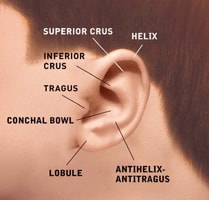
Step 3 – Closing the incisions
External stitches close the incision. Techniques are individualized, taking care not to distort other structures and to avoid an unnatural “pinned back” appearance.
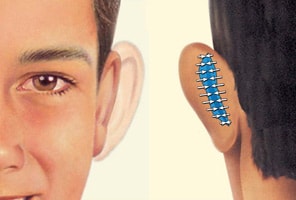
Step 4 – See the results
Ear surgery offers near immediate results in cases of protruding ears, visible once the dressings that support the new shape of the ear during initial phases of healing are removed. With the ear permanently positioned closer to the head, surgical scars are either hidden behind the ear or well hidden within the natural creases of the ear.

What should you expect after ear surgery?
What should I expect during my ear surgery recovery?
Discomfort immediately following ear surgery is normal and can be controlled with pain medication. There may be an itchy feeling under bandages. It is essential that bandages remain intact and are not removed for any reason. Failure to do so may result in loss of some of the correction and may require a secondary surgery.
Be sure to ask your plastic surgeon specific questions about what you can expect during your individual recovery period:
- Where will I be taken after my surgery is complete?
- What medication will I be given or prescribed after surgery?
- Will I have dressings/bandages after surgery? When will they be removed?
- Are stitches removed? When?
- When can I resume normal activity and exercise?
- When do I return for follow-up care?
The practice of medicine and surgery is not an exact science. Although good results are expected, there is no guarantee of complete satisfaction with the results. In some situations, it may not be possible to achieve optimal results with a single surgical procedure and another surgery may be necessary.
When you go home
After surgery, bandages or dressings will be applied to keep your surgical site clean, protect it from trauma and to support the new position of the ear during initial healing.
You will be given specific instructions that may include how to take care of your ears following surgery, medications to apply or take orally to aid healing and reduce the risk of infection and when to follow-up with your plastic surgeon.
Should any complications occur, notify your plastic surgeon who will determine if any additional treatment is needed.
Be careful
Following your physician’s instructions is key to the success of your surgery. It is important that the surgical incisions are not subjected to excessive force, sunlight or tanning bed light, abrasion or motion during the time of healing. Your doctor will give you specific instructions on how to care for yourself.
It’s very important to follow your plastic surgeon’s instructions and attend follow-up visits as scheduled.
What results should I expect after ear surgery?
Ear surgery offers almost immediate results in cases of protruding ears, visible when the dressings that support the new shape of the ear during initial phases of healing are removed. With the ear permanently positioned closer to the head, surgical scars are either hidden behind the ear or well hidden within the natural creases of the ear.
The results of more extensive ear surgery and reconstruction may appear in stages over time.
Ear Surgery Before & After Photo

Contact us for more information

